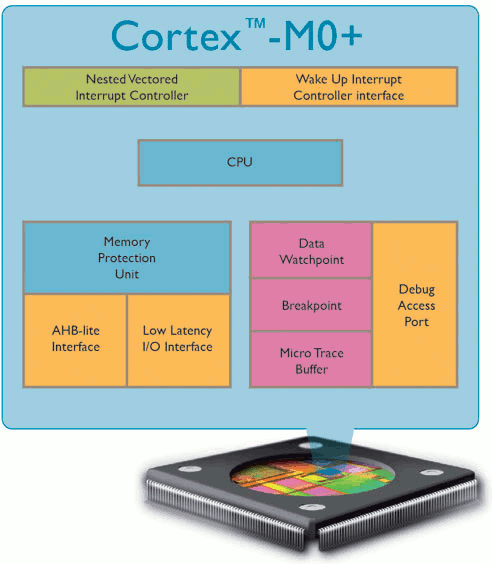ARM has just unveiled the ARM Cortex-M0+ 32-bit processor optimized to deliver ultra low-power and low-cost MCUs to power the ‘Internet of Things‘ by controlling connected intelligent sensors and smart control systems in a broad range of applications including home appliances, white goods, medical monitoring, metering, lighting and power and motor control devices.

ARM claims the Cortex-M0+ consumes just 9µA/MHz on a low-cost 90nm LP process, around one third of the energy of any 8- or 16-bit processor available today, while delivering significantly higher performance (1.77 CoreMark/MHz).
Beside the low power consumption, the main advantage of the Cortex-Mo+ over 8-bit and 16-bit MCUs , is that it can provide low power wireless connectivity to a variety of embedded systems such as wireless sensors.
The new processor is based on Cortex-M0 processor but has been redesigned to include a few new features such as:
- Single-cycle IO to speed access to GPIO and peripherals
- Improved debug and trace capability
- 2-stage pipeline to reduce the number of cycles per instruction (CPI) and improve Flash accesses, further reducing power consumption.
Two companies have already licensed the new Cortex-M0+ core:
- Freescale with the Kinetis L Series MCUs. The silicon is ready and the Kinetis L Series MCUs will be showcased at Design West on March 26-29, 2012, although Freescale will only announce the details of Kinetis L series in June 2012 at the Freescale Technology Forum.
- NXP – No MCU family name or availability were disclosed.
The Cortex-M0+ processor can be programmed using C language and is binary compatible with existing Cortex-M0 processor tools and RTOS. The code will also be compatible with Cortex-M3/M4 if you want to upgrade your design at a later stage.
The Cortex-M0+ processor is already supported by the ARM Keil Microcontroller Development Kit (MDK) which includes Keil µVision IDE and debugger. The MDK used with ULINK debug adapters can support new trace features available in the Cortex-M0+ processor. Third-party tools and RTOS will also be available from CodeSourcery, Code Red, Express Logic, IAR Systems, Mentor Graphics, Micrium and SEGGER, says the company.
You can get more information on ARM Cortex-M0+ page.

Jean-Luc started CNX Software in 2010 as a part-time endeavor, before quitting his job as a software engineering manager, and starting to write daily news, and reviews full time later in 2011.
Support CNX Software! Donate via cryptocurrencies, become a Patron on Patreon, or purchase goods on Amazon or Aliexpress




